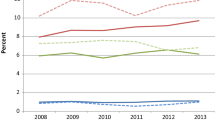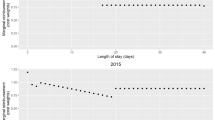Abstract
The Mental Health Parity Act of 1996 had as its goal the equity of coverage of mental health care and physical health care. The purpose of this study was to examine the outcomes of hospital concurrent utilization review as a measure of the progress toward the equity goal. The study examined 4 years of denials of certification for reimbursement by payers of inpatient care (1998–2001). Psychiatry was first compared to clinical services with a like number of annual admissions and then compared to clinical services with a like number of concurrent reviews. For each year, psychiatry had the highest numbers of cases denied and patient days denied. The most frequent reason for a psychiatric denial was that the inpatient benefit level had been exceeded. There was only one instance, in 4 years, when this reason (benefit limit exceeded) was given for a patient with a physical illness. This study provides evidence of the current inequity of reimbursement for treatment of mental illness.
Similar content being viewed by others
References
US Department of Health and Human Services.Mental Health: A Report of the Surgeon General. Bethesda, Md: US Dept of Health & Human Services, Substance Abuse and Mental Health Services Administration, Center for Mental Health Services, National Institutes of Mental Health; 1999.
National Mental Health Association. Mental health parity legislation to be reintroduced. 2003. Available at: www.nmha.org/newsroom. Accessed January 28, 2003.
National Mental Health Association. New mental illness parity bill named in honor of the late Senator Paul Wellstone. 2003. Available at: www.nmha.org/. Accessed March 17, 2003.
National Alliance for the Mentally Ill. State mental illness parity laws. 2002. Available at: www.nami.org. Accessed September 19, 2003.
Gitterman D, Sturm R, Scheffler RM. Toward full mental health parity and beyond.Health Affairs. July/August 2001;4:68–76.
Hennessy KD, Goldman HH. Full parity: steps toward treatment equity for mental and addictive disorders.Health Affairs. July/August 2001;4:58–67.
Allen K.Mental Health Parity Act: Despite New Federal Standards, Mental Health Benefits Remain Limited. Hearing Before the Committee on Health, Education, Labor, and Pensions, US Senate. Washington, DC: US General Accounting Office, Health, Education & Human Services Division; 2000. Report No. GAO/HEHS-00-95.
Merrick EL, Garnick DW, Horgan CM, et al. Benefits in behavioral health carve-out plans of Fortune 500 firms.Psychiatric Services. 2001;52:943–948.
Salkever D, Shinogle J, Goldman H. Mental health benefit limits and cost sharing under managed care: a national survey of employers.Psychiatric Services. 1999;50:1631–1633.
Greenwald J: Mental health parity not as costly as feared.Business Insurance. 2000;34(31)3, 16.
Sturm R, Zhang W, Schoenbaum M. How expensive are unlimited substance abuse benefits under managed care?Journal of Behavioral Health Services & Research. 1999;26:203–210.
Peele P. Benefit limits in managed behavioral health care: do they matter?Journal of Behavioral Health Services & Research. 1999;26:4–30.
Ringel JS, Sturm R. Financial burden and out-of pocket expenditures for mental health across different socioeconomic groups: results from healthcare for communities.The Journal of Mental Health Policy and Economics. September 2001;4:141–150.
Hanson K. Public opinion and the mental health parity debate: lessons from the survey literature.Psychiatric Services. 1998;49:1059–1066.
Feldman S, Bachman J, Bayer J. Mental health parity: a review of research and a bibliography.Administration and Policy in Mental Health. 2002;29:215–228.
Mechanic D, McAlpine D. Mission unfulfilled: potholes on the road to mental health parity.Health Affairs. September/October 1999;18:7–21.
Wickizer TM, Lessler D. Effects of utilization management on patterns of hospital care among privately insured adult patients.Medical Care. 1998;36:1545–1554.
Wickizer T, Lessler D, Boyd-Wisckizer J. Effects of health care cost-containment programs on patterns of care and readmissions among children and adolescents.American Journal of Public Health. 1999;89:1353–1358.
Mechanic D. The managed care backlash: perceptions and rhetoric in health care policy and the potential for health care reform.The Milbank Quarterly. 2001;79:35–54.
Kiess HO.Statistical Concepts For The Behavioral Sciences. 3rd ed. Boston: Allyn & Bacon; 2001;247–250.
Howell D.Fundamental Statistics for the Behavioral Sciences. 4th ed. Pacific Grove, Calif: Brooks/Cole Publishing; 1999;322–324.
Wickizer TM, Lessler D. Effects of utilization management on patterns of hospital care among privately insured adult patients.Medical Care. 1998;36:1545–1554.
Koike A, Klap R, Unutzer J. Utilization management in a large managed behavioral health organization.Psychiatric Services. 2000;51:621–626.
Remler DK, Donelan K, Blendon RJ, et al. What do managed care plans to affect care? Results from survey of physicians.Inquiry. Fall 1997;34:196–204.
Wickizer T, Lessler D. Do treatment restrictions imposed by utilization management increase the likelihood of readmission for psychiatric patients?Medical Care. 1998;36:844–850.
Murray ME, Henriques JB. An exploratory cost-analysis of performing hospital-based concurrent utilization review.American Journal of Managed Care. July 2003;9(7):512–518.
Author information
Authors and Affiliations
Corresponding author
Rights and permissions
About this article
Cite this article
Murray, M.E., Henriques, J.B. A test of mental health parity: Comparisons of outcomes of hospital concurrent utilization review. The Journal of Behavioral Health Services & Research 31, 266–278 (2004). https://doi.org/10.1007/BF02287290
Issue Date:
DOI: https://doi.org/10.1007/BF02287290




